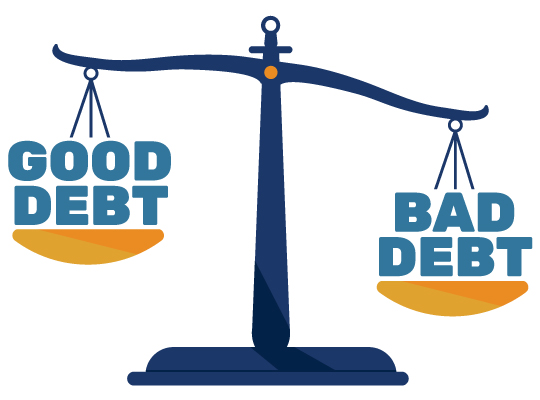Good Debt and Bad Debt: Weighing the Differences
 by: holli casto
by: holli casto
vp of training and development
Published 5/21/2024
Am I Alone in My Debt?
May is Mental Health Awareness Month, so it's high time we address a common yet often unspoken concern that impacts the mental well-being of many individuals—debt. The thought, "Am I the only one struggling with debt?" frequently crosses the minds of countless people. However, the reality is far from this perception. Debt is a widespread issue, affecting a significant portion of the population, yet it's not all detrimental. Understanding the difference between growth-oriented and burdensome debt, along with taking a strategic approach to debt, can transform your financial health and, by extension, your mental peace.

Most Americans Have Debt
Debt, in its various forms, is a shared experience among most Americans, and consumer debt has seen a massive increase since the pandemic. In 2020, an Experian study revealed that 75% of all credit card holders reported balances greater than $0, with the average balance standing at $5,315. Since then, consumer debt balances have increased by 10% from 2022 to 2023 to an average of $6,501.
Furthermore, a 2016 CFPB study found that as many as 12 million Americans use a payday loan each year. This is the only data out there on payday loan usage, and based on how outdated it is, coupled with the increase in debt usage across the board, it's likely that this figure is much higher now. In fact, Idaho has the highest average payday loan APR in the nation at 652% APR. Unfortunately, 80% of payday loan borrowers will roll over or reborrow their payday loans.
Consumer debt as a whole saw an increase in the US in 2023, with average auto loan balances increasing by 5.2% to $23,792, and personal loan balances increasing by 6.3% to $19,402. In total, all consumer debt in the US has increased by 4.4%.
Debt That Helps Vs. Debt That Hurts
Here is where it's important to distinguish the debt that helps you versus the debt that hurts you. There is debt with high interest rates, like credit cards and payday loans, that use a large portion of your budget and prevent you from being able to progress toward your financial goals. Then, there is debt that helps you grow your personal wealth and assets, like loans secured by collateral and mortgages.
Growth-Oriented Debt: it isn't always bad to borrow money
Mortgages represent a prime example of debt that can act as a catalyst for wealth accumulation. Investing in real estate can provide you with substantial long-term returns, making it a strategic financial decision rather than a burden. When you own, instead of renting, you're increasing your equity in the home you own. When you rent, you don't get that money back when you move out later on.
Furthermore, having loans like these build your credit, making it possible to take out loans in the future. In an ideal world, we would all have the cash to purchase every vehicle and home with cash on hand. In reality that's just not feasible. So, we need lenders to extend us credit to make these purchases. This is where it's important to have a good credit score.
Burdensome Debt: how high interest rates hurt you
Conversely, high-interest debts, like credit card debt or payday loans, are the type of debt that can set you back. These payments eat away at your monthly budget but can also hinder your ability to invest in wealth-building opportunities, creating a cycle of financial stress and limitation.
A Strategic Approach to Debt Management
Looking at the big picture with debt while taking actionable steps toward paying it off can alleviate a lot of the stress associated with it, especially if you have high-interest debt to pay off. Realizing that not all debt is bad debt can entirely change your mindset.
Furthermore, depending on your situation, you can take a strategic approach to paying off your debt. From consolidation, or the avalanche method, or the snowball method, these are all great methods that have worked for others, it just depends on your situation which will work best for you. It's about making informed decisions that align with your long-term financial goals, thus minimizing the mental strain associated with debt.
The idea that you're the only person who may have a lot of debt to get out from under, while a common idea, is just not true. Recognize that, while becoming largely debt-free is a fantastic goal to work towards, you are by no means alone in your debt, and not all of the debt you may have is hurting you. Everyone's financial situation is unique, but having a manageable amount of debt that allows you to own things, like cars that help you reliably get to work or a safe place to live, is helping your overall well-being more than simply being debt-free.
Furthermore, if you've paid off toxic debts before, it's totally understandable that you might be apprehensive about taking on large debts like a mortgage or auto loan. Distinguishing between growth-oriented and burdensome debts, coupled with strategic management, can transform your financial trajectory. It's not merely about overcoming debt but about understanding and using it as a tool for financial empowerment and mental well-being.
If you're feeling overwhelmed by your debt, there is help available. P1FCU partners with Greenpath Financial Wellness, and you have access to debt counseling services at no cost to you. Call them at 877-337-3399 or visit them at greenpath.com to get started.




